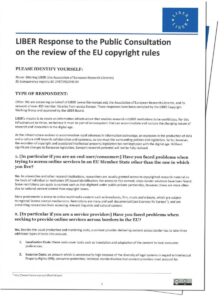LIBER Responds to EU Copyright Review

We believe that such a transformation is urgently needed. So far, the evolution of copyright and associated intellectual property legislation has not kept pace with the digital age. Without significant changes to European legislation, Europe’s research potential will not be fully realised.
In our Public Copyright Consultation Response to the consultation, we call for:
- Better harmonisation of legal and technical requirements for sharing content across EU member states;
- All exceptions related to education, learning and access to knowledge to be made mandatory. In particular, we would like to see a specific exception for text and data mining for all research purposes and for the wording of the Information Society Directive to be expanded so that it also applies to digital preservation activities;
- Safe-guarding from contracts undermining limitations and exceptions in copyright law;
- Provisions to allow e-lending by libraries, similar to analogue lending;
- Publicly-funded research results to be made openly available regardless of contracts signed with a publisher;
- Research exceptions that make no distinction between commercial and non-commercial purposes;
- Data such as hyperlinks to remain free of all intellectual property rights. They are a building block of knowledge and must be freely usable and shareable by anyone for any purpose;
- The minimum terms of protection in Europe (currently 70 years) to be reduced to life plus 50 years for copyrighted works.
Our response places a particularly strong emphasis on the changes needed to enable text and data mining for research purposes in Europe. Current licence offerings, such as that provided by Elsevier, are unreasonable in that they:
- Require researchers to provide data to a third party about their research activities;
- Limit the manner in which their research output may be made available;[/dt_list_item]
- Place arbitrary limits on the number of articles an institution may mine in a given time frame.
Some publishers have argued that licences are necessary in order to protect against increased traffic and downloading resulting from crawling for the purpose of text and data mining, which could in turn reduce the performance of their infrastructures. In its response, LIBER outlines the views of several Open Access publishers on this issue. Their experiences show that content mining is, in fact, a trivial and easily managed source of traffic.
To learn more, please download the entire LIBER Response to the Public Consultation on EU Copyright Rules (PDF). You can also read our:
Related news articles